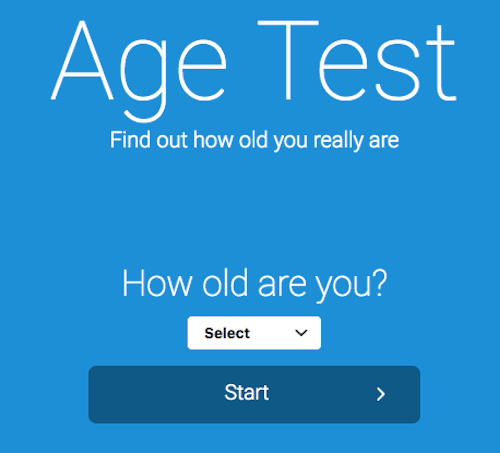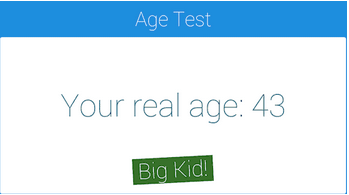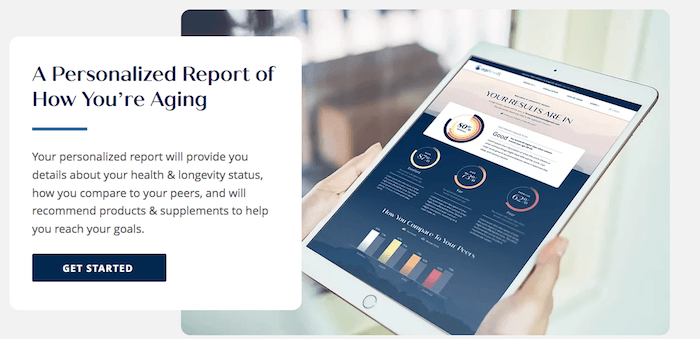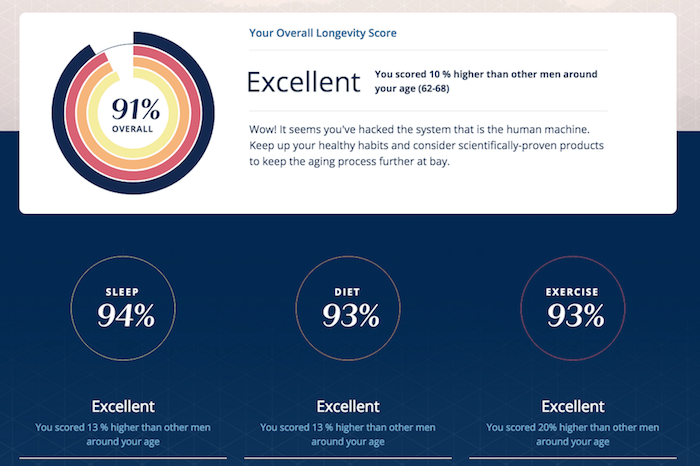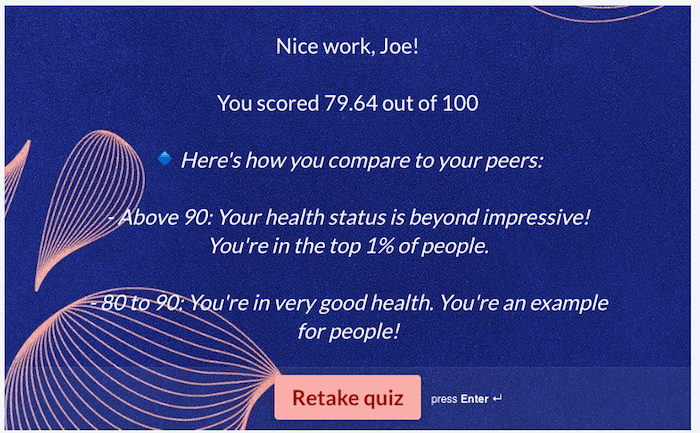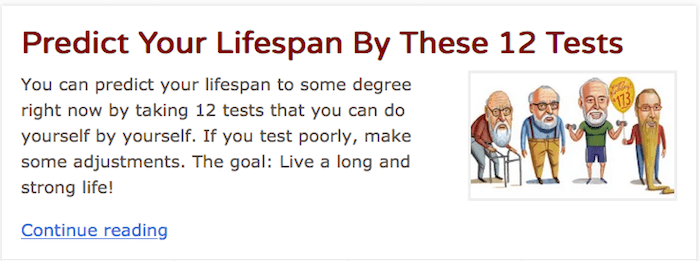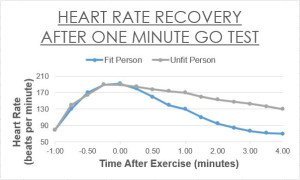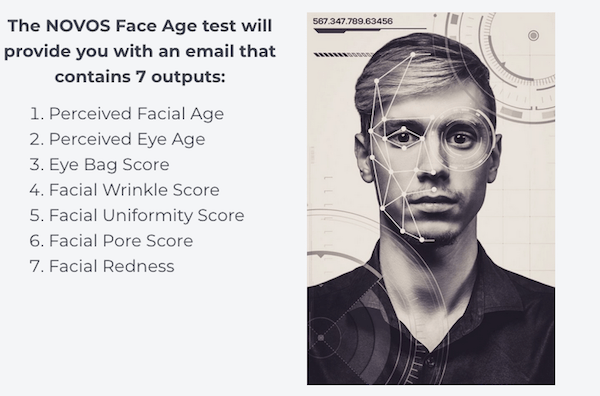Discover Your Biological Age With These 4 Tests, Part 1: What You and Your Face Say
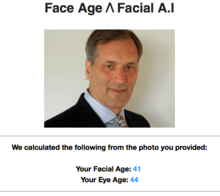
Have some fun and discover your biological age with survey questionnaire tests that reveal the lifestyle factors that affect how fast you age. Also, can a picture of your face reveal your bioage? Test it!
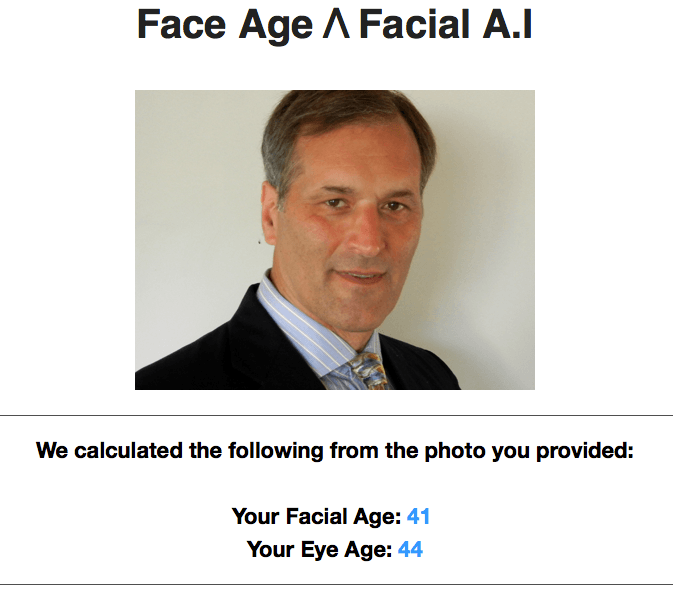 Wouldn’t you like to discover your biological age?
Wouldn’t you like to discover your biological age?
The age you really are biologically, not the age the calendar says you are.
What really matters is how you feel and what you can do mentally and physically, not the number of candles crammed into your birthday cake.
This is Part 1 of a two part series that explores four different types of tests that you can use to discover your biological age.
The four biological age test types are:
- Survey-based — Evaluates your answers to questions about lifestyle factors thought to impact aging
- Physical/Emotional Tests — Assesses responses to physical and emotional outputs
- PhenoAge Test — Quantifies bioage using utilizing nine blood biomarkers
- Methylation Tests — Measures patterns of methyl groups on DNA associated with gene expression
We’ll cover the first two here, and in Part 2 will tackle number 3 (PhenoAge), and 4 (Methylation) will be covered in Part 3.
Type 1 Bioage Test: Survey-based Biological Age Tests
The reason that biological age can be different than your calendar years is due to many lifestyle and environmental factors that can either accelerate or decelerate the rate at which you age relative to the norm.
Survey-type questionnaires that seek to help you to discover your biological age ask questions about various parts of your lifestyle, such as what kind of foods you eat, how much sleep or exercise you get, your stress level, and much more. These factors are recognized as impacting how old your body is relative to your actual years on the planet.
I’m going to cover three survey-based biological age tests from:
- Age-test.com,
- AglessRx.com, and
- NovosLabs.com
I’ll tell you right up front that although such tests may be intriguing, even fun to take, they are the least accurate of the four bioage test types you can use to discover your biological age.
Age-test Survey Questionnaire
Let’s take a look at the bioage test from Age-test.com.
This test is really a questionnaire that attempts to evaluate your bioage by asking about various lifestyle factors known to slow down the aging process. Your answers to the questions predict the age of your body.
At first I thought this was BS, then I took the test and thought, “Wow this is spot on”. Then I took the Age-test a few times more, answering questions randomly. The end results were similar, which confirmed my initial thought that this is inaccurate.
So what happened is that I took this test when I was 63, and it estimated my bioage at 43, which is nearly the same as this much more scientific test that I cover in Part 2.
At first I thought that because the Age-test results were nearly the same as the scientific test results, that this particular survey-based bioage test was valid. But then I did the survey three times again, posing as a 50-year old male, a 25 year old girl, etc, and selected answers randomly. And I got bioage results that seemed random as well.
My conclusion is that it was just by chance that when I took the survey using true answers that the resulting bioage was so close to a rigorous, scientific test that I’ll tell you about in Part 2.
Moving on, let’s check out two more bioage tests based on questionnaires.
AgelessRx Longevity Quiz
AgelessRx offers a survey-type bioage test they call Longevity Quiz.
This longevity quiz is not an estimate of your biological age, but where you stand relative to others. I answered truthfully and the site presented me with this result:
Take the AgelessRx Longevity Quiz
OK, nice grades. Wish I got them in high school, but this tells me nothing about my bioage.
Novos Longevity Test
Novos is a company that sells supplements aimed at slowing down aging. What distinguishes them from most supplement companies is that they have some serious scientists that advise them, and who, I imagine, helped construct their Novos Longevity Test.
I did their survey. Here’s the underwhelming results:
Take the Novos Longevity Test
So, to sum up my experience with these three questionnaire, survey type tests:
- Age-test: biological age of 43 vs chronological age of 63
- AglessRx test: Scored 10% above others at my chronological age, surprisingly low given the 93%+ ratings on sleep, diet and exericse.
- Novos: Scored 79.64/100 “Very good health”
My bottom line: These survey-type tests may be interesting, but don’t count on the results. These sorta tests may give you a general idea for how well you’re aging given how accurate you are in answering the questions, but don’t count on the result being accurate.
Next up, the physical/emotional tests.
Type 2 Bioage Test: Physical/Emotional-based Biological Age Tests
We’re going to quickly cover these 13 tests:
- Overall strength
- Grip strength
- Sitting rising test
- Walking speed
- Heart rate recovery
- Pulse rate
- Waist circumference (how about waist to height)
- Reaction time
- Positivism
- Word use
- Fear
- Tooth loss
- Novos Lab’s face test
The first 12 I’ve already described in my post, Predict Your Lifespan By These 12 Tests, so I’ll only briefly address them here.
The 13th, is an innovative, but probably less-than-accurate bioage test based on a facial recognition algorithm developed by Novos Labs. In a bit, I’ll show you what my face revealed.
#1 Overall Strength — As this 2018 study will confirm, you need to maintain your strength as you get older if you wish to enjoy an active, independent lifestyle, and be able to do simple things, like carry a few bags of groceries up a few flights of stairs.
#2 Grip Strength — A simple strength test may predict heart attack and strokes. Every 5 kg (11 pounds) of declining grip strength was associated with a 16% increase in death from any cause, a 17% greater risk of cardiovascular death, and a 17% higher risk of non-cardiovascular mortality.
#3 Sitting Rising Test — How well you can sit and rise from the floor, without using assistance from your hands, knees or other body parts, may predict your risk of dying prematurely in the next six years.
#4 Walking Speed — Researchers found that gait speed was associated with differences in the probability of survival at all ages in both sexes, but was especially informative after age 75 years. At this age, predicted 10-year survival across the range of gait speeds ranged from 19 to 87% in men and from 35 to 91% in women.
#5 Heart Rate Recovery — How quickly your heart rate recovers after a heart-thumping workout not only indicates fitness but your risk of dying prematurely, says this 2018 study, which confirmed the hypothesis that heart rate recovery not only predicts total mortality (from all causes), but is an even stronger predictor of cardiovascular death and, surprisingly, also predicts non‐cardiovascular death.
#6 Pulse Rate — The higher the resting heart rate, the greater the risk for death. This dolorous conclusion comes from a Danish study published in Heart where researchers tracked 2,798 participants’ heart rate and oxygen consumption data from 1986 thru 2011.
#7 Waist Circumference — An American Cancer Society study of more than 100,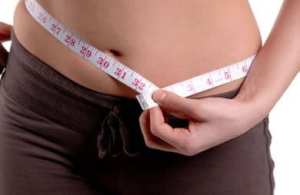 000 people over nine years showed that a large waist size doubled the risk of dying from any cause as compared to those with smaller waists, and this was true whether the person was of normal weight, overweight or obese. The key metrics are:
000 people over nine years showed that a large waist size doubled the risk of dying from any cause as compared to those with smaller waists, and this was true whether the person was of normal weight, overweight or obese. The key metrics are:
- For men, a waist size of 47 inches or larger.
- For women, a waist size of 42 inches or larger.
- For anyone, your waist should not exceed half the length of your height.
Read What Your Waist to Height Ratio Reveals About Your Health and How A Plant-based Diet Can Improve It.
#8 Reaction Time — One study measured the reaction time of over 5,000 young and middle-aged adults. Then, controlling for various health risk factors, researchers compared the reaction time results to longevity. As you might expect, there was a strong correlation between reaction time speed and longevity: those with faster reaction times predictably lived longer. You may test yourself here.
#9 Positivism — According to researchers at the University of Kentucky, a positive attitude to life can add more than a decade to your life expectancy. The more positive your attitude to life is – the more optimistic, upbeat, content and happy you are – the longer you are likely to live.
#10 Word Use — Regularly using words with a high-activated positive affect had the strongest correlation with a longer lifespan; words related to humor were most noticeable; and those who used many of such humorous words lived six years longer than psychologists who had used few humorous words, say the researchers who studied the connection between word use and longevity.
#11 Fear — If you approach your golden years calmly, you’ll live seven years longer than if you dread impending old age, say the scientists.
#12 Tooth Loss — Missing five teeth correlates to a 140% increased risk for coronary heart disease and heart attack. 
Various studies have shown that that a chronic inflammatory disease affecting the teeth and gums increase the risk of atherosclerotic vascular disease. To test this further, J.M. Liljestrand, from the University of Helsinki (Finland), and colleagues assessed the correlation between the number of missing teeth and incident cardiovascular diseases (CVDs), diabetes, and all-cause death. (Summarized here.)
Get the details of these 12 physical/emotional bioage tests
#13 Novos Lab’s Face Test — Using artificial intelligence to visually measure facial age, Novos’ algorithms have been trained on 12 million images to mimic human perception of aging. Note, that this “human perception” is not the same thing as an actual biological test of biological aging, but you might find it interesting.
I uploaded my picture to the Novos website, and they emailed me this result:
Take the Novos Face Age Test
I was 59 when that picture was taken. Interestingly, the “eye age” of 44 is the same as the same bioage predicted by the PhenoAge test based on blood markers that I took when 63. That, in part, will be addressed in the type 3 and 4 bioage tests that I’ll cover in Part 2.
So, in Part 2, we’ll dig into Type 3 Bioage Test: PhenoAge, and in Part 3, Type 4 Bioage Test: Methylation Age
Your Takeaway
Remember these four things about the first two of four test types that enable you to discover your biological age:
- Bioage tests based on survey questionnaires are useful in that they inform you about the many lifestyle factors that matter to your aging rate, but they’re typically inaccurate.
- Bioage tests based on facial features do have some nifty artificial intelligence and powerful algorithms behind them, but the bioage they predict you are is largely based on how “good” the picture of your face is that you submit for evaluation.
- Physical/emotional bioage-dependent tests don’t really establish a bioage for any particular test (in our case, the 13 reviewed here), but each of them does contribute to an overall picture of your healthspan. In other words, if you do well on all 13, you’ve likely slowed down your aging rate.
- You will want to read Part 2, because that’s where I’ll tell you about the most accurate tests currently available for you to discover your biological age.
Last Updated on November 8, 2023 by Joe Garma

